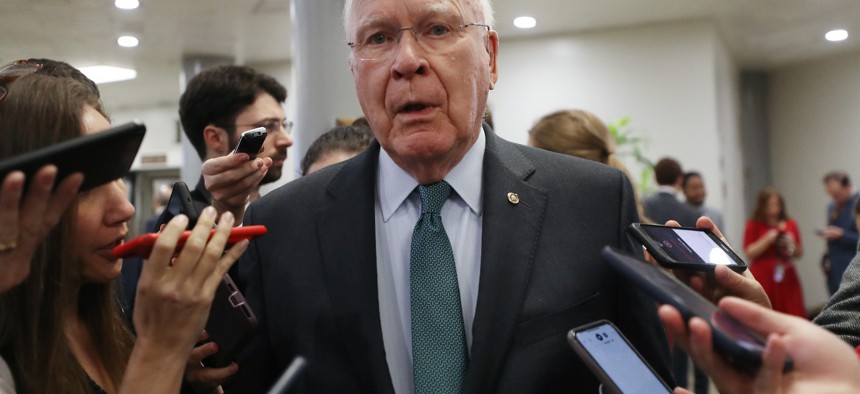The House approves a 6.7% full-year domestic spending increase, and another CR

Sen. Patrick Leahy, D-Vt., one of the chief architects of the omnibus spending bill, said: "It is unquestionably in the interest of the American people that the House and the Senate act quickly to pass this bill and send it to the president." Mario Tama/Getty Images
The Senate must act on the stopgap measure by Friday to avoid a shutdown, before taking up the omnibus spending package.
The House on Wednesday passed a $1.5 trillion measure to set line-by-line funding for federal agencies for the rest of fiscal 2022, finally providing full-year appropriations that will boost spending at domestic agencies by nearly 7%.
With just over 48 hours until Friday’s shutdown deadline, lawmakers also approved a four-day stopgap bill to give the Senate enough time to approve the omnibus measure. The upper chamber will have to act on the continuing resolution—which would be the fourth of the current fiscal year—by Friday evening to avoid a lapse in appropriations, which will require a sign off from every senator.
Lawmakers unveiled the bipartisan agreement early Wednesday morning following months of negotiations that were slowed by a lingering failure to agree to top-line funding levels for defense and non-defense spending. President Biden and congressional Democrats had sought to provide only a small increase to the Pentagon’s budget while dramatically raising domestic agencies’ budgets by as much as 16%, but negotiators ultimately agreed to a smaller and near-equal adjustment. The bill will increase non-defense spending by 6.7% and provide a 6% bump for defense-related activities, meeting Republican demands. The House passed the defense portion 361-69 and the non-defense portion 250-171. The CR passed unanimously.
On top of that funding, the omnibus will include $13.6 billion in emergency assistance to Ukraine and NATO allies. About half of the Ukraine money will go to the Defense Department, while about $4 billion will go to the State Department and other agencies to provide humanitarian assistance such as food and shelter to Ukrainian refugees in Europe. The departments of Treasury, Energy, Commerce and Justice will all receive funds to enforce sanctions and for other efforts to combat Russian aggression. The Health and Human Services Department, U.S. Agency for International Development and other agencies were set to receive a combined $15.6 billion for ongoing pandemic response efforts, but lawmakers scrapped the provision at the 11th hour.
The vote on the bill was delayed after some House Democrats objected to a Republican-demanded provision offsetting the new COVID-19 spending by canceling some of the unspent funds from the American Rescue Plan, which their home states had still planned to spend. To ensure the measure could still pass, House Speaker Nancy Pelosi, D-Calif., opted to remove the funding from the larger package. Pelosi called the decision "heartbreaking," but said the House had no choice but to proceed with the omnibus on Wednesday. She added the House planned to vote on pandemic relief funding separately, though it is unclear if such a bill can win sufficient Republican support in the Senate.
Still, members of both parties were hopeful the omnibus would support many of their priorities.
“This bill makes bold investments in critical areas that went underfunded or even neglected in the previous administration, including education, childcare, healthcare, the environment, science and research, and many more,” said Sen. Patrick Leahy, D-Vt., chairman of the Senate Appropriations Committee and one of the chief architects of the bill. “It is unquestionably in the interest of the American people that the House and the Senate act quickly to pass this bill and send it to the president.”
Sen. Richard Shelby, R-Ala., the top Republican on the appropriations panel, also called for the bill’s quick adoption, but highlighted the increase to defense spending and the bill’s rejection of “liberal policies.”
Nearly every federal agency would see a funding increase under the measure, though some are set to receive larger bumps than others. Biden had pushed to keep spending at the Homeland Security Department flat in fiscal 2022, but Congress instead opted to provide an 11% increase. The Internal Revenue Service would see its largest funding boost in more than 20 years as the agency faces an unprecedented backlog of tax returns and unanswered calls from taxpayers. As the Transportation Department begins implementing much of the recent Infrastructure Investment and Jobs Act, it is set to receive a 17% funding increase. Lawmakers set aside more than $20 billion for research and resilience efforts related to climate change and $1 billion to stand up Biden’s proposed Advanced Research Projects Agency for Health.
“The bipartisan funding bill is proof that both parties can come together to deliver for the American people and advance critical national priorities,” said Office of Management and Budget Director Shalanda Young. “It will mean historic levels of assistance for the Ukrainian people, a bold new initiative to drive unprecedented progress in curing cancer and other diseases, and more support to keep our communities safe.”
Agencies have been operating under a CR since Oct. 1, leaving in place spending levels signed into law by President Trump in 2020. Democrats were eager to boost funding, but negotiations dragged on for months as Republicans insisted on a lower total and more money for the Pentagon. Lawmakers had hoped to introduce the omnibus earlier in the week so Biden could sign it into law ahead of Friday’s deadline, but delays forced a vote on a fourth CR of the fiscal year that would keep agencies afloat through March 15. The Senate will attempt to pass it on an expedited timeline by Friday night to avoid a shutdown as it considers the larger appropriations bill.
Rep. Tom Cole., R-Okla., on the House floor Wednesday praised Democrats for working with his party to set aside their differences.
“Neither side got everything they wanted,” Cole said. “At the end of the day, it's a good balance for Congress and for the nation.”



